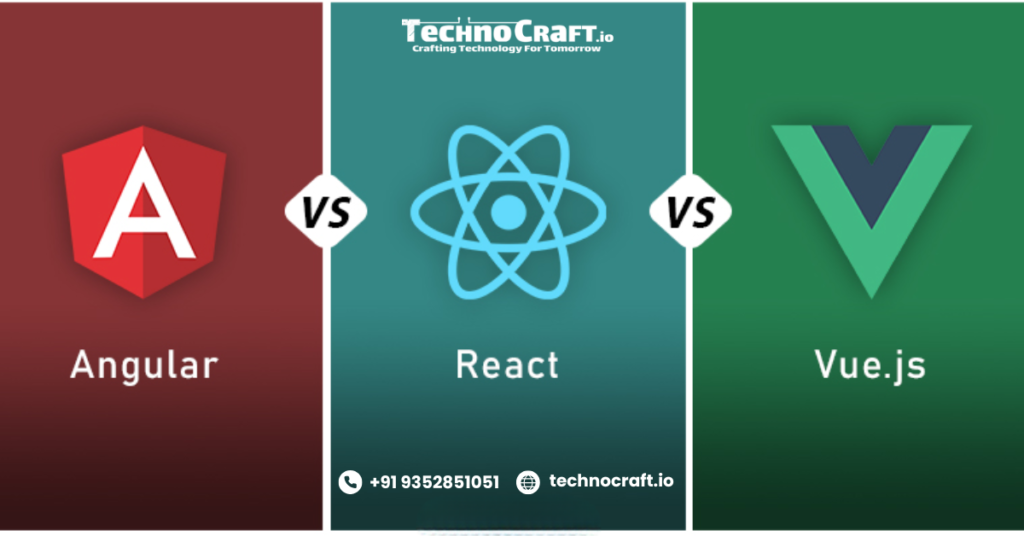When it comes to front-end development, choosing the right JavaScript framework is crucial for the success of your project. Angular, React, and Vue are the three most popular options available today. Each of them has its strengths and weaknesses, and the best choice depends on your project’s specific needs. In this article, Techno Craft will compare Angular vs. React vs. Vue to help you decide which one is the best fit for your next project.
1. Overview of Angular, React, and Vue
Angular
Developed and maintained by Google, Angular is a full-fledged framework that provides a comprehensive solution for building scalable web applications. It follows the MVC (Model-View-Controller) architecture and uses TypeScript, which helps maintain cleaner and more structured code.
React
Developed by Facebook, React is a JavaScript library that focuses on building interactive UI components. React uses a virtual DOM to improve performance and allows web developers to build reusable components using JSX (JavaScript XML).
Vue
Vue is a progressive JavaScript framework that is easy to integrate with existing projects. It is a lightweight and flexible option that provides reactive data binding and a simple API for building user interfaces.
2. Performance Comparison
Performance is a critical factor when selecting a framework. Let’s compare how Angular, React, and Vue perform in different scenarios.
- Angular: Uses real DOM, which can slow down performance in large applications. However, Angular provides tools like Ahead-of-Time (AOT) compilation and lazy loading to optimize performance.
- React: Uses a virtual DOM, which improves rendering efficiency. React is optimized for high performance, especially in dynamic applications.
- Vue: Also utilizes a virtual DOM, making it highly efficient. Vue’s lightweight structure enhances performance, particularly in small-to-medium-sized applications.
Winner: If performance is your top priority, React and Vue have an edge due to their virtual DOM implementation.
3. Learning Curve and Ease of Use
Ease of learning is an essential factor, especially for beginners and teams that need to get up to speed quickly.
- Angular: Has a steep learning curve due to its extensive features and use of TypeScript. It requires understanding complex concepts like dependency injection, decorators, and modules.
- React: Has a moderate learning curve. Developers need to learn JSX, component-based architecture, and state management using tools like Redux.
- Vue: Offers the easiest learning curve. Its simple syntax and clear documentation make it beginner-friendly.
Winner: Vue is the easiest to learn, making it an excellent choice for beginners and teams looking for quick adoption.
4. Scalability
If you’re working on a large-scale project, scalability is a crucial factor to consider.
- Angular: Best suited for enterprise applications due to its powerful built-in features and robust architecture.
- React: Highly scalable with the right state management tools like Redux, but requires additional libraries for a full-fledged application.
- Vue: Suitable for small-to-medium applications. For large-scale applications, Vue needs additional tools like Vuex for state management.
Winner: Angular is the best choice for large and enterprise-level applications due to its built-in features and structured approach.
5. Community and Ecosystem
A strong community and ecosystem ensure better support, regular updates, and a wide range of third-party libraries.
- Angular: Has strong community support backed by Google. However, it has a slower adoption rate among individual developers compared to React.
- React: Has the largest community and ecosystem, making it easy to find resources, tutorials, and third-party libraries.
- Vue: Has a growing community, but it is smaller than React and Angular. Vue is more popular in Asia and among smaller teams.
Winner: React has the largest and most active community, making it an ideal choice if you need extensive support and third-party integrations.
6. Flexibility and Customization
Every project has unique requirements, so flexibility and customization play a significant role in choosing the right framework.
- Angular: Provides an opinionated structure with strict coding conventions. While this ensures consistency, it can be limiting for developers who prefer flexibility.
- React: Extremely flexible. Developers can choose their preferred libraries and tools, but this also means additional setup time.
- Vue: Strikes a balance between flexibility and structure, allowing developers to use features as needed without excessive configuration.
Winner: React offers the highest level of flexibility, but Vue provides a great balance between structure and customization.
7. Which One Should You Choose?
Choosing between Angular, React, and Vue depends on your project’s requirements, team expertise, and scalability needs.
- Choose Angular if: You’re developing a large-scale, enterprise-level application that requires a full-fledged framework with built-in features.
- Choose React if: You want flexibility, strong community support, and high performance for dynamic web applications.
- Choose Vue if: You need a simple, easy-to-learn framework for small-to-medium projects with quick development time.
Final Thoughts: Make the Right Choice Today!
Each of these frameworks has its strengths, and the best choice depends on your specific project requirements. Whether you need the robust architecture of Angular, the flexibility of React, or the simplicity of Vue, you can build powerful and scalable applications with the right approach.
🚀 Ready to start your project with Best Website Development Company in Jaipur? If you need expert guidance in selecting the right framework and building a high-performance web application, contact us today! Let’s bring your vision to life with the best technology stack tailored to your needs.



